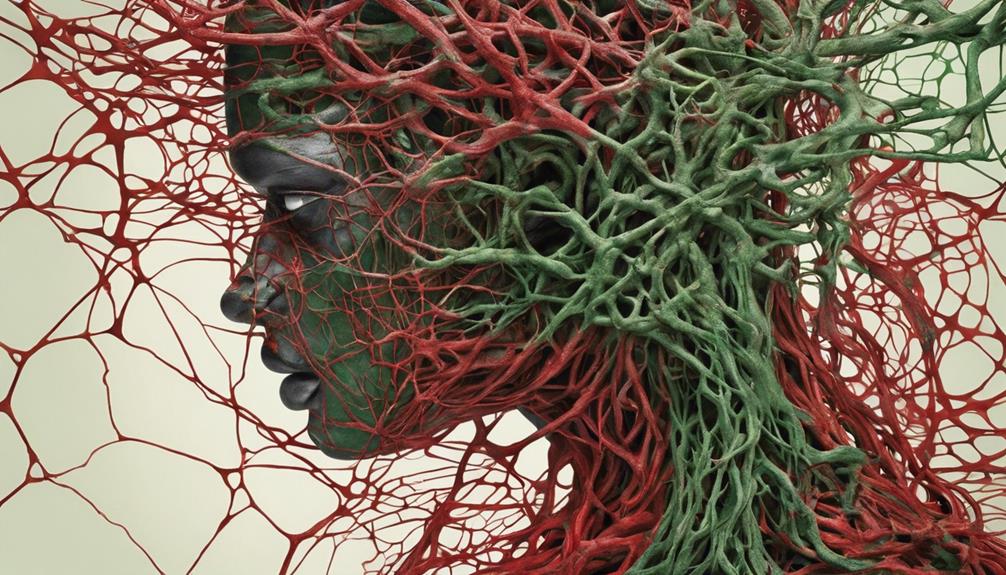Exploring the roots of male jealousy reveals a striking statistic: studies show that jealousy is a common emotion experienced by both men and women, but its manifestations and triggers can differ significantly between genders.
As we uncover the layers of male jealousy, we are confronted with a complex interplay of emotions, experiences, and societal influences that shape this phenomenon. Understanding these intricate dynamics not only sheds light on the complexities of human relationships but also offers valuable insights into the ways we can navigate jealousy in a more nuanced and empathetic manner.
Key Takeaways
- Insecurity and immaturity fuel male jealousy.
- Trust issues and fear of inadequacy contribute.
- Past behaviors like cheating can intensify jealousy.
- Brain chemistry, especially oxytocin, influences jealousy levels.
Common Triggers of Male Jealousy
In understanding the roots of male jealousy, one must delve into the common triggers that often ignite feelings of insecurity and possessiveness in men. It's crucial to recognize that factors like past experiences, fear of inadequacy, and the desire to control can all contribute to these emotions.
Our relationships are deeply intertwined with our sense of self-worth and security, making it vital to address any underlying insecurities that may be fueling jealousy. By acknowledging and working through these triggers, we can cultivate healthier dynamics built on trust and mutual respect.
Through introspection and open communication, we can navigate these complexities together, fostering a deeper understanding of ourselves and our partners.
Underlying Factors in Male Jealousy

Exploring the core components that fuel male jealousy provides valuable insights into the intricate dynamics of relationships and individual perceptions. This jealousy often stems from feelings of insecurity or perceived threats to emotional or physical intimacy. However, understanding these emotions can also help identify deeper connections, such as the early signs he loves you, which may manifest in protective behavior or increased attentiveness. It is essential to recognize that while jealousy can be problematic, it may also be rooted in genuine care and concern for the relationship.
- Insecurity and fear of inadequacy can be significant triggers.
- Trust issues often underlie feelings of jealousy.
- External factors such as societal norms and media influence can impact jealousy levels.
Understanding how these factors interplay can help individuals navigate their emotions and cultivate healthier relationships. By acknowledging and addressing these underlying factors, individuals can work towards building trust, enhancing self-worth, and fostering secure attachments.
It's crucial to recognize that jealousy is a complex emotion influenced by a variety of elements, and by delving into these underlying factors, we can gain a deeper understanding of its roots.
Impact of Past Behaviors on Jealousy
Understanding the lasting impact of past behaviors on jealousy illuminates the intricate dynamics that shape individuals' emotional responses in relationships. Past actions like cheating can create lingering feelings of betrayal and insecurity, becoming a breeding ground for jealousy. These experiences can lead to a heightened sense of vigilance, seeking signs of potential threats even in innocent situations.
The scars left by past behaviors can make it challenging to trust again fully, as the fear of history repeating itself looms large. It's vital to address these past wounds with compassion and understanding, working together to rebuild trust and create a healthier, jealousy-free relationship built on honesty and mutual respect.
Role of Fear in Male Jealousy

Past behaviors like cheating can create a breeding ground for jealousy, where fear becomes a central driving force in male emotional responses within relationships. Fear can manifest in various ways, influencing thoughts and actions in complex manners:
- Constant Need for Reassurance: Seeking constant validation to alleviate fears of inadequacy.
- Overanalyzing Interactions: Reading too much into innocent interactions due to underlying insecurities.
- Heightened Sensitivity to Threats: Reacting strongly to perceived threats to the relationship, even if unfounded.
These fears can stem from past experiences or personal insecurities, shaping the lens through which men view their relationships. Understanding and addressing these fears are crucial in navigating jealousy and fostering healthier connections.
Influence of Brain Chemistry on Jealousy
Brain chemistry intricately influences the intensity of jealousy experienced within relationships. Understanding how our brain chemicals impact jealousy can shed light on our emotional responses. Here's a table illustrating the influence of different brain chemicals on jealousy:
| Brain Chemical | Influence on Jealousy |
|---|---|
| Testosterone | Not a direct predictor of jealousy |
| Oxytocin | Influences feelings of security |
| Gender Differences | Less significant than believed |
| Oxytocin Levels | Higher levels lead to more secure relationships |
Addressing Insecurity and Immaturity

Addressing insecurity and immaturity requires proactive communication and a commitment to personal growth within relationships.
- Engaging in open and honest conversations about feelings and fears.
- Seeking therapy or counseling to work through underlying insecurities.
- Embracing vulnerability and sharing emotions to foster understanding and connection.
Dealing With Trust Issues in Jealousy

Navigating trust issues in jealousy requires open communication and a willingness to address underlying insecurities head-on. When dealing with trust issues in relationships, it's essential to create a safe space for honest conversations and vulnerability. Here is a helpful table to guide you through managing trust issues in jealousy:
| Challenges | Approaches |
|---|---|
| Lack of Communication | Regular check-ins and sharing feelings |
| Past Betrayals | Therapy for healing and rebuilding trust |
| Insecurities | Affirmation and reassurance from partners |
Frequently Asked Questions
Can Jealousy in Men Be Influenced by Cultural or Societal Factors?
Absolutely, societal norms and cultural expectations impact male jealousy. Our upbringing, media influences, and societal constructs shape how men perceive relationships and jealousy. Understanding these influences helps navigate and address jealousy effectively.
How Do Individual Personality Traits Contribute to Male Jealousy?
We believe individual personality traits significantly impact male jealousy. Insecurities, communication styles, and attachment patterns can all influence the way jealousy manifests. Understanding these nuances can lead to healthier relationships and personal growth.
Are There Effective Strategies for Managing Jealousy in Men Without Therapy or Counseling?
We've found that open communication, building trust, and fostering self-worth are key. Understanding triggers and addressing insecurities can help manage jealousy. Developing healthy relationship dynamics and self-awareness are effective strategies for men.
Can Jealousy in Men Be a Sign of Deeper Emotional Issues Beyond Insecurity?
Exploring the depths of male jealousy can unveil hidden emotions beyond mere insecurity. Beneath jealousy's surface lie layers of vulnerability, fear, and unmet needs, reflecting a complex web of emotions awaiting understanding and healing.
Is There a Correlation Between Men's Jealousy and Their Attachment Style in Relationships?
Yes, there can be a correlation between men's jealousy and their attachment style in relationships. Our experiences and early attachments influence how we perceive and react to situations, impacting jealousy dynamics in relationships.
Conclusion
As we unravel the intricate threads of male jealousy, we uncover a tapestry woven with deep-rooted insecurities, fears, and past experiences.
The impact of brain chemistry and past behaviors intertwine to create a complex web of emotions.
By addressing insecurity and trust issues, we pave the way for healthier, more secure relationships.
Let's navigate through the labyrinth of jealousy with empathy and understanding, shedding light on its origins and implications.









